Octavius Augustus Caesar
CommonName: Augustus
FullName: Octavius Augustus Caesar
Reign: 43 BC-14 AD
Title: Emperor
Born: 63 BC
Died: 14 AD
Relationship: The name later taken by Octavian
Gaius Octavius Caesar, as he was called when he
took up the inheritance of Julius Caesar, was the man who defined the term
"emperor" as we have come to know it. A less promising candidate would
have been difficult to find, since in 44 BC he was not only still a "boy",
as Antony called him, but one in poor health and with little tactical skill.
Julius Caesar, however, no mean judge of men, made Octavius his principal
heir, so he must have seen something beyond the wimpy facade.
Born in 63 BC, of equestrian stock (from the section
of the population who served as the cavalrymen when Rome's army consisted
of citizen levies; hence neither from noble nor lower-class family), his
only connection with the upper classes was of recent origin. His father
was a new senator; this father died in 59. Octavius's mother was Julius
Caesar's niece; in 59 Julius was just beginning his career. Due to Julius's
influence Octavius received a variety of (mainly minor) public posts as
part of his training; while still in training he learned that Julius had
been assassinated and he was his posthumously adopted heir.
He could have refused; that was the advice of most
of his contacts. He was 18, with few allies of note, and with powerful
enemies. Foremost among these was Marc Antony, who felt himself the real
heir of Caesar, whatever Caesar himself had to say, and he seized Caesar's
papers and assets. Octavius had to raise funds on his own to pay debts
and legacies, which did not endear Antony to him.
Octavius found his first allies in the Senate, especially
among those who had regarded the assassination of Caesar as an unpleasant
necessity. Foremost among these was Cicero, who regarded Octavius as an
ally against the crude military thuggery represented by Antony and his
ilk. Octavius for his part had every intention of avenging Caesar, but
was willing to bide his time, and thus was able to use the Senate for his
own ends. The Senate underestimated him; he consolidated his position,
then switched sides to ally with Antony against the "Liberators" (the assassins
of Caesar). The Triumvirs ("Three Men"; the third was Lepidus) crushed
them, then purged the Senate of opponents. Not for them the clemency of
a Julius; Octavius even turned Cicero over to Antony to murder, despite
their supposed friendship.
Masters of the Roman world, the three divided it
among themselves. Antony demanded, and received, the richest portion, namely
the eastern provinces. Lepidus drew North Africa; Octavius was seemingly
stuck with the barbarous parts of Europe. This share, however, included
Italy, and Rome itself, albeit supposedly the others were allowed significant
influence. Octavius remembered what Antony forgot: that military power
was the key to successful rule, and that constant training against tough
opponents was the key to that power.
Relations between Octavius and Antony were strained
at best, and a revolt in Italy by Antony's wife Fulvia did not help. After
Fulvia's death the two made some attempt to come to terms; Antony married
Octavian's sister Octavia, whose loyalty to her new husband did Octavius
no end of good, since it made Antony look like such a cad to treat her
with contempt.
Octavius had another great asset in his conflict
with Antony, namely his old friend Agrippa. This school chum was not only
a very competent tactician but entirely loyal as well; a rare enough combination
anywhere. Octavius himself developed formidable strategic and political
skills, while Antony lost his army in a sloppy invasion of Persia, lost
his political advantages through his open infatuation with Cleopatra, then
suffered final crushing defeat at Actium. The training, against Germanic
barbarians and Pompey's son's pirates, had paid off.
Octavius made the most of his victory. He founded
the city of Nikopolis, "City of Victory", in commemoration, and he saw
the sights in Alexandria. Like most commanders he admired Alexander, so
he went to see the tomb of the great Macedonian; when he was invited next
to see the tombs of the Ptolemies, he is said to have replied, "I came
to see a King, not a row of corpses".
The Senate, ever willing to be subservient to the
man with the legions, voted Octavius all sorts of powers, as well as the
title Augustus, by which he was generally known, in 27 BC. Augustus himself
showed much deference toward the Senate, doing his best to act as though
he were its servant rather than its master; he let it have the form of
power, while he kept the substance. Augustus thus made his principiate
(from Princeps, first citizen) palatable by using the forms of the Republic.
His later rule was looked on by subsequent generations
of Romans as a sort of golden age, as he did much to reform and improve
the Roman state. He reformed the laws, and acted as a social engineer.
Most notable, according to his biographers, were his reform of the marriage
laws; given that he considered it in the best interests of Rome to have
the people produce as many legitimate free citizens as possible he gave
privileges and tax breaks to the fathers of large families, while doing
his best to penalize the childless and unmarried. He also engaged in lavish
public works projects; given that the imperial capitol was so vulnerable
to flooding from the Tiber, as well as to fire, he had much of it rebuilt.
He rebuilt so much that he later claimed to have found Rome a city of brick,
and left it one of marble.
His generals, notably first Agrippa, then Tiberius,
kept busy waging war against German barbarians. In one of these wars Varus,
through gross negligence, perished with three legions in the Teutoburger
Forest in AD 9. In general, however, Augustus's generals kept things under
control.
His family life was somewhat less successful. He
married Livia Drusilla, divorcing her from her first husband, and they
got along well enough. They had no children, however. Livia had two of
her own; the first was Tiberius, and the second, Drusus; she was pregnant
with the latter when Augustus married her. Augustus had a daughter Julia
by a previous marriage; she was first married to Agrippa, then after his
death to Tiberius.
Augustus's designated heirs were his grandsons through
Julia, namely Caius and Lucius, who he formally adopted. Unfortunately
for him, first Caius, then Lucius, died, and Julia with her daughter Julia
were proven guilty of all sorts of immoral conduct. He then adopted the
third grandson, Agrippa Posthumous, along with Tiberius, as his heir; the
former's unsuitability and thuggish nature made Augustus send him into
exile.
His attitude to life can be seen from his use of
various proverbial phrases, preserved for us by Suetonius. His motto in
general was "festina lente", roughly "hasten slowly". He often commented
that someone would repay him "on the Greek Calends", as the Kalends was
a term used only in the Roman calendar, it meant "never". Another was "Let
us be satisfied with this Cato", namely to be concerned with the situation
as it is, not as it would be were it ideal.
Augustus died in 14 AD, leaving a state which, thanks
largely to his efforts, was prosperous, well-run, and probably as beneficial
to the well-being of the people as a military dictatorship could possibly
be.
Home
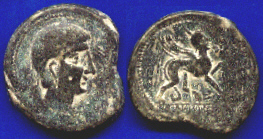
CASTULO, extra big AS (double unit?). 24,8 gr., 31 mm, 5 mm thick !!!!!.
Villaronga 7 (pag. 331). In this city was born Himilce, Hannibal's iberian
wife O: Diademed iberian male head to r. R: Sphinx to r., in front star, below
Iberian legend "KASTILO" (almost all out of flan becouse it is too small for
this big coin (it is too thick and trunk-pyramidal). I have to notice you that
these flans were casted, not cutted
Augustus, AE31,Castulo, Spain, Diademed head right. / Helmeted Sphinx advancing right. SGI 15. vF / VF, dusty green
patina. The Sphinx was the personal symbol of Augustus, and he used it on his seal ring.
------------------------------------------------------------------------------------------------------------------------------------------------------
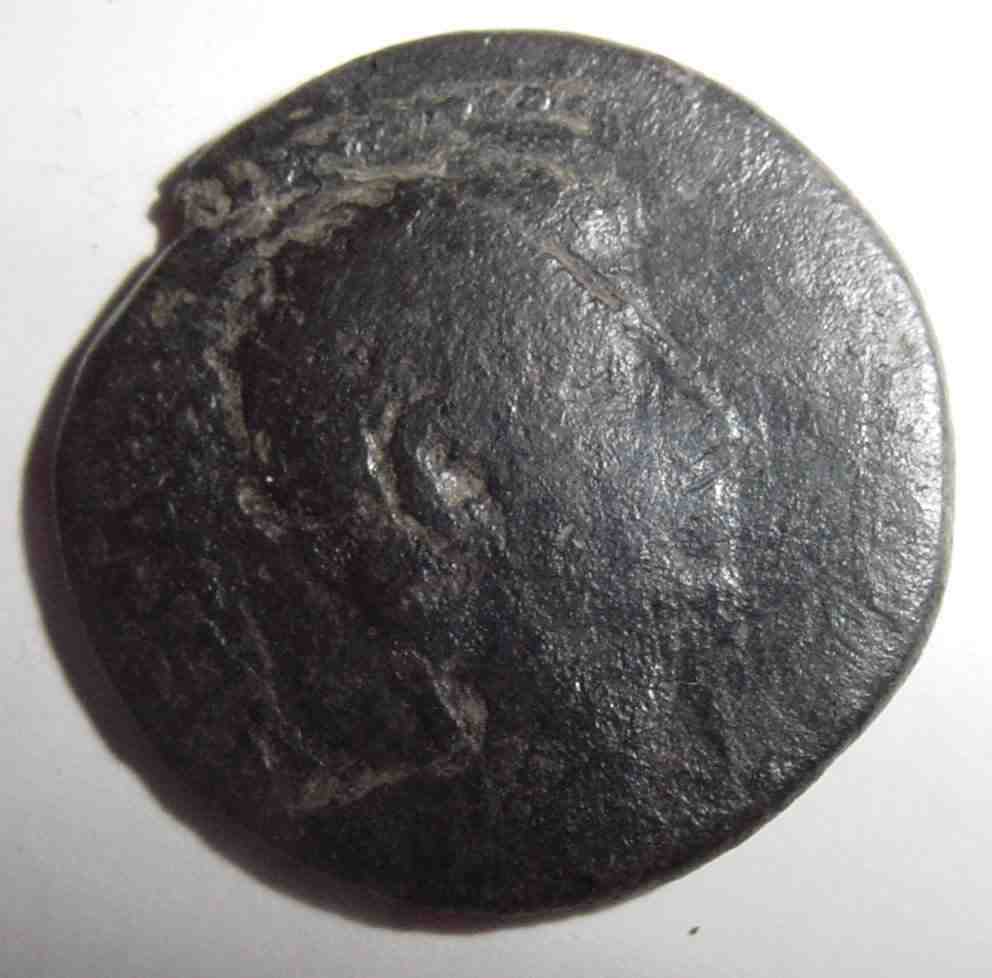
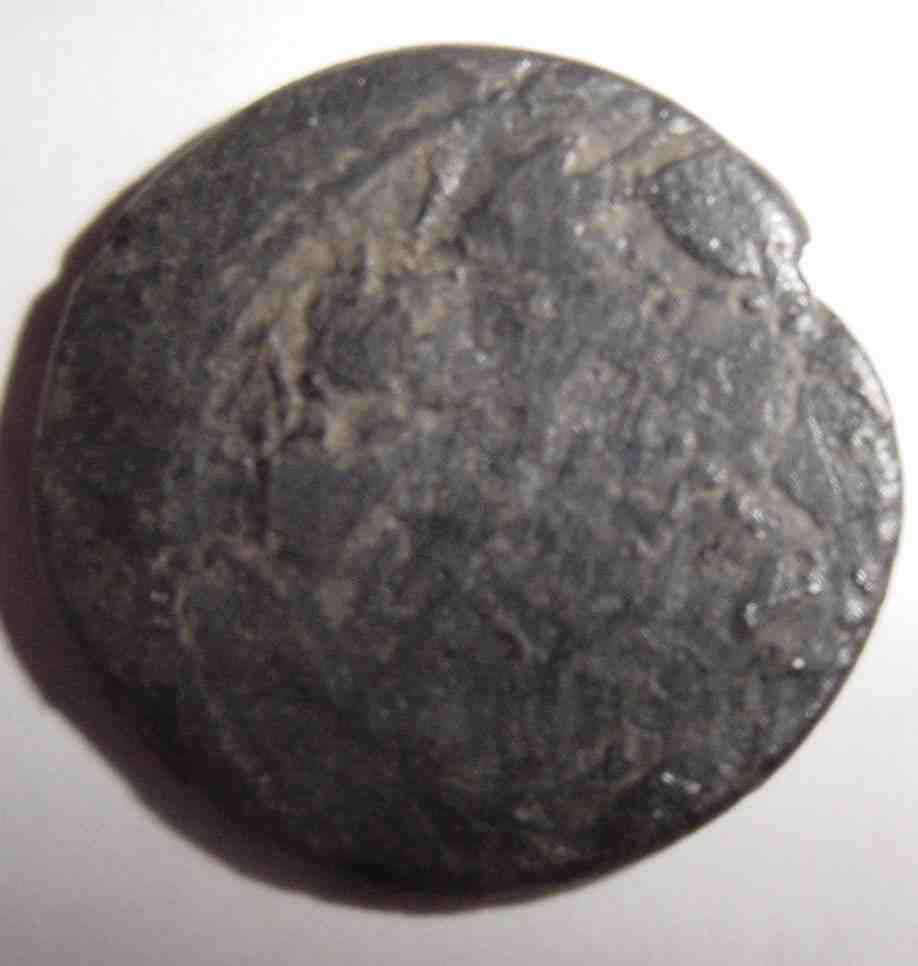
Augustus, AE28, (12.99g) c. 25 BC, Asia Minor Mint, CA coinage, CAESAR
Bare head right. / AVGVSTVS in rostral wreath. RPC2235. F, dark patina,
with some areas of dirt.
---------------------------------------------------------------------------------------------------------------------------------------------------------
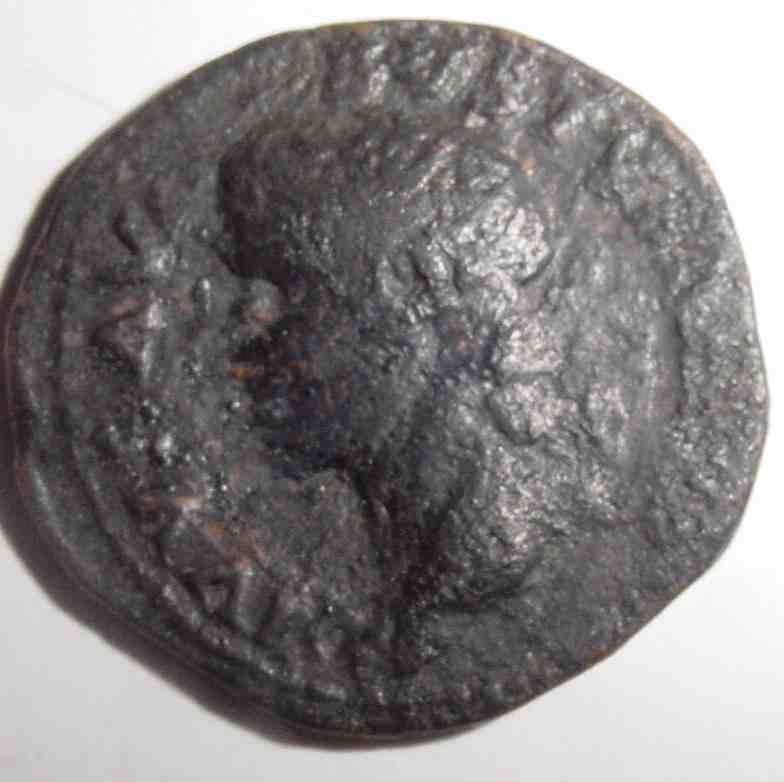

Augustus 27 B.C.- A.D14. AE AS Rev : PROVIDENT S.C facade of
altar enclosure of Ara providentiae Augusti with double panelled door N
VF-VF
---------------------------------------------------------------------------------------------------------------------------------------------------------
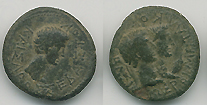
AUGUSTUS u.Rhoemet.+Pythodoris, AE 21,ss-v
Augustus, AE25, Kingdom of the Thrace, (8.85g) [BASI/\EOSPOIMHTA/\KOY]
Jugate heads of Rhoemetalces, and Pythodoris right.
/ [KAISAPOSSEBASTOY]
Bare head of Augustus right. RPC1711. VF, dark patina.


